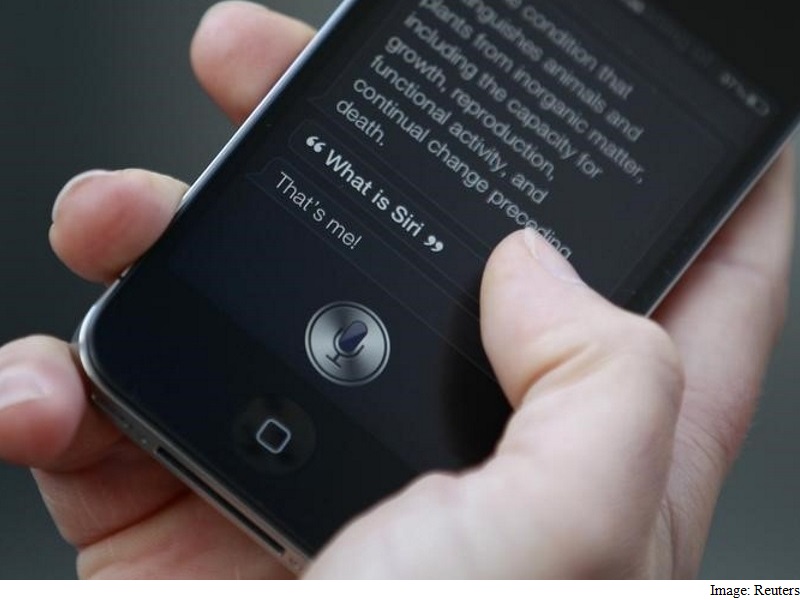- Home
- Mobiles
- Mobiles Features
- There's a Serious Problem With Voice Control That We're All Ignoring
There's a Serious Problem With Voice Control That We're All Ignoring

I said, in a clear and somewhat stern tone, "Hey Siri . . . . "
Immediately, the woman in front of me turned around and started to open her mouth almost as if to reply, but then stopped. She looked both puzzled and almost offended. Was I talking to her? Was I, in fact, issuing an order to a complete stranger?
This got me thinking. As we look at new ways of controlling our gadgets, it's becoming clear that some of them are more suited to being used in public and others are best left to more private use. To me, voice control which is becoming a big feature in many, many gadgets -- falls firmly into this second category, because it's something best done when you're one-on-one with your phone.
After all, if you hate it when your dinner companion is bent over a screen, how much worse is it for them to be carrying on an entirely different conversation without you? Have you ever had a half-conversation with someone who turns out to be talking on the phone using a Bluetooth headset or headphones? Getting caught up in someone's conversation with their inanimate assistant is just like that, only worse.
I'm not alone in thinking this way.
"I do think that there are places where having that speaker out loud isn't appropriate: out on the street, in the subway, the elevator, in a car, standing in line to get a sandwich or coffee. Those are places I wouldn't use it," said Lizzie Post, the great-great-grandaughter of etiquette extraodinaire Emily Post and writer and podcaster on etiquette in the modern age for the Post Institute.
Post also noted that, even when you're in a more private setting, there are still times when it feels odd to bring your technology into the conversation. She said that she'd once been brainstorming a project with someone who pulled out his phone and asked it to find an item for him online. It was off-putting, Post said.
"There was no reason not to type it in he had no reason to be hands-free," she said. "It starts to sound like you're dictating to a secretary when you don't need to be."
I'm not saying voice control technology is bad. In the car, it can be a literal life-saver if it keeps you from fumbling with a touchscreen behind the wheel. I'm as excited as anyone about reports that Apple's working on wireless earbuds that let you control Siri, or that Amazon is working on a more portable version of its voice-controlled Echo. In your home, with your family, it feels kind of neat to speak to your gadgets to set timers or reminders.
But those are all situations when you're either alone, or where it's acceptable for you to pull your attention to the side for a moment. In other social settings many people tend to pitch their voices as if they're issuing orders when talking to their technology, as I did at the airport. That makes people sit up and take notice, even if you think you're being discreet. "Remind me to buy deodorant" is not something you want to bark into your phone on the bus. Ditto to dictating emails within earshot of your co-workers. (Bonus rudeness points if the emails are about your co-workers.)
Even if you're saying something totally harmless "Hi sweetie, running a little late" saying it out loud in public still drops people into discussions in which they never asked to be participants. That can be uncomfortable, particularly if it comes out of the blue and makes those around you feel as if they've wrongly stumbled into a private conversation. And making the people around you uneasy is pretty much the definition of rude.
Which gets back to the notion of public technology versus private technology. I've come up with a basic way to categorize this: If it's something you'd feel goofy doing at your cubicle, it's probably a private technology. To define it even more clearly, here are some examples. Eye-tracking screens, for instance, are fine to use in public because they're unobtrusive. Virtual reality is private, because you are literally cutting off all sensory inputs to the outside world. Augmented reality, which blends the digital and virtual worlds, walks a fine line but is arguably more public because you still interact with the world (and people) around you. Gesture control depends on the situation. If you're having to make big arm-waving motions, that's best done at home. If it's more subtle, like a hand swipe to get to the next presentation slide, you're probably fine.
This isn't to say that either of these is more useful than the others, or even more social using VR with another person is surprisingly wonderful for conversation. The same is true of voice control: Using your voice to dictate messages can save you time or let you be more coherent than you could be in a fast, thumb-typed message. But those are situations when you're using your phone to facilitate communication, not to step away from it.
So, yes, talk to Siri or Cortana or Google or Alexa, but think about the context. "The blanket tip we offer for all technology is to think about the people you're with first," Post said.
That's good advice for using voice control, and for whatever other crazy and wonderful technologies may come down the pike.
© 2016 The Washington Post
Get your daily dose of tech news, reviews, and insights, in under 80 characters on Gadgets 360 Turbo. Connect with fellow tech lovers on our Forum. Follow us on X, Facebook, WhatsApp, Threads and Google News for instant updates. Catch all the action on our YouTube channel.
Related Stories
- Samsung Galaxy Unpacked 2025
- ChatGPT
- Redmi Note 14 Pro+
- iPhone 16
- Apple Vision Pro
- Oneplus 12
- OnePlus Nord CE 3 Lite 5G
- iPhone 13
- Xiaomi 14 Pro
- Oppo Find N3
- Tecno Spark Go (2023)
- Realme V30
- Best Phones Under 25000
- Samsung Galaxy S24 Series
- Cryptocurrency
- iQoo 12
- Samsung Galaxy S24 Ultra
- Giottus
- Samsung Galaxy Z Flip 5
- Apple 'Scary Fast'
- Housefull 5
- GoPro Hero 12 Black Review
- Invincible Season 2
- JioGlass
- HD Ready TV
- Laptop Under 50000
- Smartwatch Under 10000
- Latest Mobile Phones
- Compare Phones
- Redmi Turbo 5
- Redmi Turbo 5 Max
- Moto G77
- Moto G67
- Realme P4 Power 5G
- Vivo X200T
- Realme Neo 8
- OPPO Reno 15 FS
- HP HyperX Omen 15
- Acer Chromebook 311 (2026)
- Lenovo Idea Tab Plus
- Realme Pad 3
- HMD Watch P1
- HMD Watch X1
- Haier H5E Series
- Acerpure Nitro Z Series 100-inch QLED TV
- Asus ROG Ally
- Nintendo Switch Lite
- Haier 1.6 Ton 5 Star Inverter Split AC (HSU19G-MZAID5BN-INV)
- Haier 1.6 Ton 5 Star Inverter Split AC (HSU19G-MZAIM5BN-INV)

















